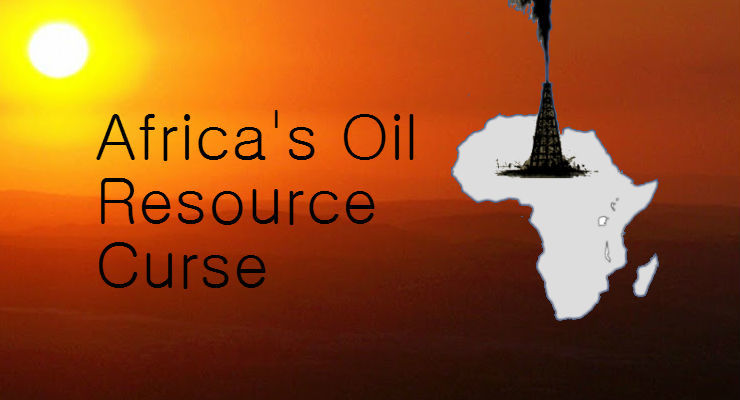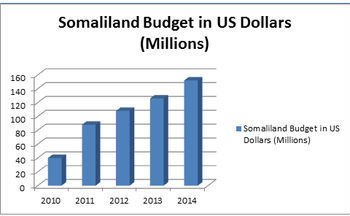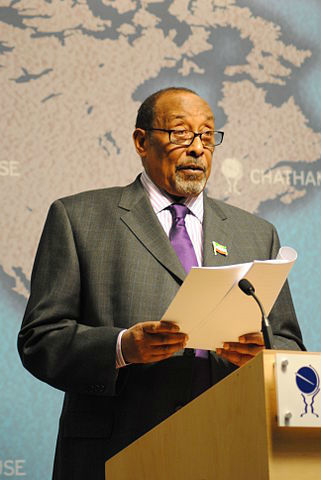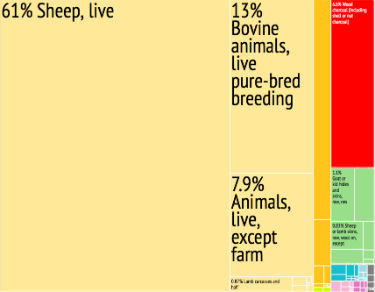
By Abdirahman Mohamed Dirye
Secretive deals signed between Somaliland’s Minister of Minerals and Energy Hussein Abdi Dualeh and international oil firms could have far reaching impact on the region’s future. In the wake of the most recent revelations, it is important to remember that developing natural resources requires an enduring emphasis on Somaliland transparency. This is the only way to ensure that the potentially significant revenue created benefits local communities and the Somali people at large.
The resource curse and poverty have been twin enemies for Africa and a recent report ‘What’s the Point of Transparency?‘ by the Open Society Foundation has evidence showing the harm of not providing locals with information about the “payment of revenues to governments by oil, gas and mining companies”. The report shines light on the extensive historic evidence of terrible consequences that can result from murky deals between governments and the resource extraction industry while also highlighting the benefits that transparency can bring.

Publishwhatyoupay.org and Extractives Industry Transparency Initiatives (EITI) are two organizations at the front-lines combating the global resource curse. EITI is an established set of standard practices and minimum criterion for transparency in the resource extraction industry. Such international standards are meant to ensure an “enabling environment” for civil society participation, with stakeholders being able to “freely speak on transparency and natural resource governance issues”.
Murky deals hang on the African continent as few countries are designated to be EITI compliant. For his book, “Untapped: The Scramble for Africa’s Oil“, author John Ghazvinian, “visited all of the major sub-Saharan oil producers and typically found the same situation in each. The sizzling oil sector was enriching a clique of politically connected people and creating boomtowns catering to the industry but seldom providing much wider economic benefit or even employing many local people.”
Somaliland: Roughly the size of England and Wales
Somaliland’s anti-corruption committee, judiciary and law enforcement agencies are far behind those of other African states. In the past weeks, Somaliland ministers including Abdi Dualeh traveled frequently to Dubai to persuade foreign investors to return to Somaliland without community-elected representative presence in consultations. The creation of a military force called the Oil Protection Unit (OPU) from these negotiations is spreading concern the lessons learnt by other countries are being ignored. The Somaliland government is turning its back on transparency and engaging on a crackdown of people critical of the government deals. People like me.

Somaliland nationals want an open system accountable to the parliament when social justice policy compensates internally displaced inhabitants nearby exploration sites. But the situation in the making is far from ideal for transparency unless changes are immediately enforced on existing contracts before it’s late. For greedy companies, it is sometimes easier and less costly to deal with an authoritarian regime than with a responsible one.
So far no written guidelines about resource extraction exist in Somaliland and the minister decides according to his mood even if he is riding roughshod over his people. There is are no programs to ensure the resource extraction industry will contribute to the campaign against poverty reduction in the areas where the Oil Protection Unit will operate. Another travesty is that so far there has been no mention, real or imaginary, of infrastructure construction even though some of the deals are said to have included oil concessions and patents lasting 25 years to a century.
Michael T. Klare is a professor of peace and world security studies at Hampshire College in Massachusetts and also is the author of the books “Resource Wars” and “Blood and Oil”. In a recent CNN article, Klare explains that the resource curse, “applies specifically to poor countries that don’t have a lot of sources of wealth to begin with; then there’s a discovery of a major resource — oil or copper or gold — that suddenly becomes a major source of wealth for that country. Theoretically the development of that resource could produce great wealth for that nation, but historically it leads to the concentration of wealth in the hands of a few — those who monopolize the collection of rents from the mining or the drilling for oil — and the exclusion of the majority from any benefit.”
The result Klare said, are “repressive governments that cling to power, so they can monopolize the collection of resource wealth, and an impoverished population — a recipe for conflict”.
Dictator Siyad Barre’s brutalization and subjugation of the Somali people was accomplished through militarization of all aspects of life and still haunts entire region. Somaliland’s founding father Abdirahman Ahmed did something that no one else did to avoid foreign intervention; he categorically refused foreign troops to operate in Somaliland. When United Nation’s Secretary General Boutros Boutros-Ghali famously asked Ahmed to let UNISOM forces come to Somaliland to stop bloodshed in Berbera province, Ahmed replied: “if even the last one dies, we’ll never ever allow foreign troops to come to our soil.”
Somaliland’s Community Structure
Unlike the federal system of the United States or Switzerland, Somaliland is a tribal society with each ethnicity living in certain territories. If foreign firms ignore the clan dynamics and tribal realpolitik sharing benefit system in the country, they may inadvertently ignite tribal conflict. Somaliland resources utilization policy among the triad of the people, the government and the investors should be implemented to avoid unfair distributions that could cause catastrophe of immense proportions.
As it is now organized, the OPU force would effectively be highly financed and well trained foreign mercenaries operating in the absence of parliamentary approved laws and subject only to foreign law. Somaliland only recently created a terrorism fighting unit called the Rapid Response Unit (RRU) that has become well known as a foreign funded brutal force which terrorizes civilians during the night. The RRU set a very bad precedent for foreign-owned military groups operating in Somaliland.
The creation of this new foreign financed, highly trained and well-armed military force parallel to the existing Somaliland national army tacitly gives the OPU more power than the arm without having to operate under the constitution. This is a naked violation of sovereignty if Somaliland (or Somalia) had any to begin with. Furthermore, the sleeping cells of jihadists in Somaliland would surely join any disenchanted tribal rebels masquerading as genuine protesters rightly demanding their fair share of revenues only to then set the entire region aflame. The real danger is that almost every tribe in Somaliland buried heavy weapons following the recent conflict and they are still ready to use them again when their interests are at stake.
The Khatumo tribal entity in the eastern part of Somaliland has been constant reminder of this recently and many farsighted people relate the newly gained momentum of the group to foreign interested oil firms backing rebellion. Somaliland can’t financially sustain war within her borders and better the lives of her citizens simultaneously. The potential for conflict to erupt if the community’s role in resource management is marginalized or their grievances remain unaddressed still exists.

There already enough existing military forces in Somaliland capable of protecting national elections and providing security to citizens throughout the year. Then, why need for an additional army? What is their mandate? Are Somaliland’s claims to an “oasis of stability” similar to such claims in Iraq and Syria before ISIS took control? Or are the people less valuable than the oil installations for the potential investors, and therefore; the ill paid and ill trained Somaliland army cannot be trusted with investment?
Somaliland MP Abdirahman Mohamed Hoog has equated the possible formation of OPU with Blackwater Security controversy that led to the killing of seventeen unarmed civilians in the American Iraq War of 2003. Some have claimed that Blackwater’s crimes happened because the firm enjoyed immunity from Iraqi courts bestowed by the American government.
Somaliland being an unrecognized international entity makes it difficult to enforce international laws on a normal day and therefore the legal channel to pursue abuses would be quite limited. The presence of foreign-run military forces in Somaliland would therefore also complicate any transparency process.
Community communication
Any deals that exclude communities from the decision making process to enrich a few are defunct. This proposal has already sent a wrong signal to the community that their resources would be shared between war-profiteering companies and few greedy individuals. According to a United Nations report, Somaliland, where ministers nakedly violate national laws, is no better at combating corruption than the Somalia government itself and thus can’t be relied on to share the benefits of a resource boom.
“These same firms often argue that their role in Africa is simply getting oil out of the ground, maximizing profits and paying taxes. Politicians, they contend, are responsible for investing the tax revenues in education and infrastructure”. Ghazvinian stated. The disclosure and clear crystal policy on revenues is vital in prevention of communal unrest. Surely, with the great public suspicion that is aroused by oil giants worldwide, the formation of an ad hoc military force without parliament discussion is something that should be illegal.
Striking deals behind closed doors without any consultation with either parliament or Guurti (Council of Elders) brings about imbalance and deprives the people of their God-given resources. Foreign firms interested in the resource extraction industry in Somaliland should follow the Extractives Industry Transparency Initiatives (EITI) endorsed by many countries. Unless they are bound to do so by EITI transparency rules, the status quo won’t change. Neither I nor any other Somalilander supports the planned arrangement for these key national resources. It is time for change.
Mohamoud Walaaleye says
First your quoting Michael T. Klare explains that the resource curse, “applies specifically to poor countries that don’t have a lot of sources of wealth to begin with; then there’s a discovery of a major resource — oil or copper or gold — that suddenly becomes a major source of wealth for that country.”
Doesn’t automatically implies if Somaliland discover oil resource curse will be imminent, because it isn’t poor now, as you might aware their budget reaches over 200 million dollar, and every year is increasing.
Second when you are saying “The creation of this new foreign financed, highly trained and well-armed military force parallel to the existing Somaliland national army tacitly gives the OPU more power than the arm without having to operate under the constitution.” You seemed naive the matter relating OPU and need to get further information. In short, OPU is not creation of new force, they are part of Somaliland Police force, as RRU, and needs no external law or act relating to be passed parliament, and is not against constitutional
you seem reversed biased views such as Michael Walls who wrote his book “The situation in the east of Somaliland also seems to be heading steadily towards some sort of denouement.” swathe tangible developments Somaliland itself accomplished without penny assistance outside, and whatever your proof less writings and more other to come won’t deter what Somaliland populace determined to grasp.
Lastly, countless oil companies interesting exploration of Somaliland’s oil understands better than you all overall situations and verily appreciate to invest their wealth explorations much profits are anticipated to offer.
Abdirahman Mohamed Jama (Awxoog) MP,Somaliland House Of Representatives says
Oil exploration and mineral extraction agreements without the approval of Somaliland Parliament (House Of Representatives) and establishment of the OPU (Oil protection Unit). both are illegal and unconstitutional .
Somaliland’s Minister Of Mineral Resources and Energy has openly refused on public television to bring oil exploration and mineral agreements to the parliament for ratification. Surely, this is a naked violation of Somaliland constitution.
Article 53 of Somaliland constitution clearly defines the Powers and Duties of the House of Representatives. Article 53, clause 3 states that the House Of Representatives shall ratify governmental agreements (treaties) such as political, economic and security agreements.
The establishment of the OPU is also illegal and unconstitutional and direct breach of articles 123 and 124 of Somaliland constitution. Under articles 123 and 124, the creation of just three forces are permissible namely:- The National Army, The Police and the Custodial Corps (Prison Guards).
By the way my name is Abdirahman Hoog not Hussein Hoog as mentioned in this article of yours, Abdirahman .
Abdirahman says
sorry for the error, i am the author of the article i meant to say Abdirahman Xoog, that’s you but sorry for the misnomer..